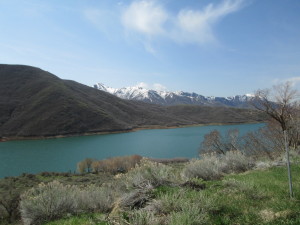Yesterday, with much help from my patient and ever-helpful husband, I moved my writing desk to the third floor—and away from the phone and the distractions of email and the Internet. (Yes. The draft I’m currently working on I’m writing by hand.) To further simulate a writing space where Jane Austen or George Sand might have composed, a brass, wind-up clock I’d bought at a yard sale sits on my desk, too, its gentle ticks calming me as I work.
My desk just fits in a little alcove under a skylight. So when I’m stuck—which happens every five minutes or so—my eyes travel upward to watch clouds or circling swallows or the wind move through the tops of trees across the street. At one such stuck moment yesterday, I noticed a tiny green bug hurtling itself against the skylight screen. The next stuckness; there that bug was, again. Preoccupied with my work—What does this character want? What’s motivating this character?—it took me a few such stucknesses to realize that the bug was trying to get out. Throwing itself against that screen again and again. Moving towards light.
As is, I realized, my character!
Thanks bug. Thanks, Light.












